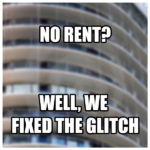 The scene is from the movie Office Space:
The scene is from the movie Office Space:
Bob #1: Uh, Milton Waddams.
Dom: Who’s he?
Bob #2: You know, squirrely looking guy. Mumbles a lot.
Dom: Oh, yeah.
Bob #1: Yeah, we can’t actually find a record of him being a current employee here.
Bob #2: I looked into it more deeply, and I found that apparently what happened is that he was laid off five years ago, and no one ever told him about it. But through some glitch in the payroll department, he still gets a paycheck.
Bob #1: So we just went ahead and fixed the glitch.
Lumbergh: Great.
Dom: So, uh, Milton has been let go.
Bob #1: Well, just a second there, professor. We, uh, we fixed the glitch so he won’t be receiving a paycheck anymore so it’ll just work itself out naturally.
Bob #2: We always like to avoid confrontation whenever possible. The problem is solved from your end.
The “Bobs” would have been perfect modern landlords. Well, they would have been perfect imperfect landlords. They don’t like to confront their problems and they take passive-aggressive steps with a hope that a situation will just “work itself out”. All too often, when tenants go bad, landlords act the same way. They delay taking the necessary steps to deal with a situation or take some indirect action in the hope that the problem will just go away or remedy itself. They try to “fix the glitch” with a dire hope that the situation will resolve itself without direct conflict. That rarely happens.
Landlords, don’t “fix the glitch”.
I recently spoke with a landlord who had a tenant who was refusing to move. The apartment was being rented out on a month-to-month basis well below market value and the landlord wanted to regain possession to fix up the unit and rent it out for a higher amount. The trouble is, the tenant liked the below market rent and did not want to move. On top of that, the tenant was behind in rent payments. The landlord suggested notifying the tenant of an increase in rent because the tenant would probably not want to stay if the rent was increased. I suggested serving a five day notice for rent now due.
The landlord was hoping that an increased rent would be just enough agitation to the tenant to make the tenant finally move. The trouble is, the tenant is already comfortable in missing rental payments. Why would a landlord reasonably believe a tenant would actually move out just because the rent was increased when the tenant already ignores the terms of the tenancy?
I see this pattern over and over. When a landlord is dealing with a bad tenant and I explain to the landlord the details of the admittedly arduous process for evicting a tenant, the landlord might hopefully suggest that “the tenant’s lease ends in three months, so maybe I’ll just let this go and the tenant will leave at the end of the lease term”. No, no, no! Why would a tenant abide by a lease termination date when the tenant is already ignoring the rest of the lease? They won’t!
Now, I’m not saying that the only option is an eviction. In fact, I’ve suggested on these pages many times that landlords should seek “eviction alternative” such as cash-for-keys. However, landlords cannot just bury their heads in the sand hoping that the situation will resolve itself. I’ve been doing this for a long time and I rarely see a situation resolve itself without direct landlord intervention and hard work. Landlord’s can’t avoid confrontation. They need to meet landlording challenges head-on. That doesn’t mean things need to get belligerent nor does it mean that the landlord always needs to end up in court, but it does mean the landlord needs to take an active role in managing the rental business. And, of course, all landlords would probably benefit from some legal advice on best practices and legal options. Talk to your lawyer. Serve notices in person. Talk to the tenant. Engage with the tenant to find a solution. Go to the property rather than sending texts or letters. Be active and involved. Don’t just fix the glitch.
